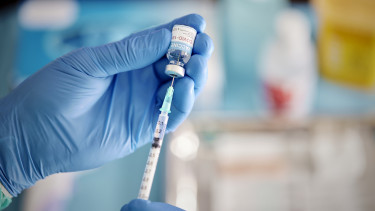Hungary back in talks with EU on Pfizer COVID-19 vaccine purchase due to Omicron

In the EU’s new (fifth) contract with Pfizer-BioNTech, EU member countries agreed to activate an order of more than 180 million doses of Comirnaty adapted for the Omicron variant, European Commission President Ursula von der Leyen said last night.
In comments made following a meeting of the the European Council, von der Leyen said that vaccine contracts already signed with drugmakers included the option for the companies to deliver vaccines modified for variants, if needed, in 100 days.
The adapted vaccine could be available by end-March or early April, and the European Medicnes Agency (EMA) could approve its use by April or May, as it said it can assess them on an accelerated timeline.
"We know that viruses mutate, and we’re prepared," said Emer Cooke, the executive director of the European Medicines Agency, in testimony to the European Parliament's health committee on 30 November.
Cooke said that regulations have already been in place since February allowing vaccine makers to fast-track the approval process if modified coronavirus vaccines are needed.
Portfolio contracted the Coronavirus Press Centre to confirm or deny our scoop that Hungary also wants to partake in the joint EU procurement of Pfizer’s adapted COVID-19 vaccine.
This was their response:
Hungary is currently in discussions with the European Union on the terms of the new EU vaccine procurement launched in relation to the Omicron variant.
This marks quite a turnaround in the stance of Prime Minister Viktor Orbán’s government.
In late May, the EU executive confirmed a new deal with Pfizer-BioNTech for the possible purchase of up to 1.8 billion doses until 2023, following 600 million doses ordered via the two previous contracts.
Hungary was the only EU country that decided not to be part of the joint purchase, expressing confidence in the country’s own supply of vaccines. Gergely Gulyás, Orbán's chief of staff, argued that even if a booster was needed, "there are plenty of vaccines from Eastern and Western sources as well.”
“It was a wise and responsible decision by the government not to participate in the second round of EU vaccine procurement”, Gulyás said at the Hungarian parliament’s justice committee’s annual hearing less than three weeks ago.
At the same time, Foreign Minister Péter Szijjártó said Hungary was not in talks with either Russia or China about new shipments of the Sputnik V or Sinopharm vaccines to Hungary. “The next shipment of vaccines will most certainly not include vaccines from the East. Both Sputnik and Sinopharm suppliers have fulfilled the contracts we have previously signed,” he said.
Hungary wanting to join the EU’s new deal with Pfizer-BioNTech is not such a huge surprise in view of the fact that it has Hungary has already opted back into the EU's third vaccine purchase agreement with the producers for the procurement of COVID-19 vaccines for children aged 5 to 11.
Key factors that likely played a key role in the cabinet changing its mind:
- third doses became necessary to maintain the effectiveness of COVID-19 vaccines against infection;
- more than three million third doses have been administered in Hungary;
- the government donated 2.8 million doses of COVID-19 vaccines, and had to destroy 200,000 doses of Sputnik V;
- there are about 12 million doses left, 3.5 million of which are the mRNA vaccines of Pfizer-BioNTech and Moderna, which are widely used as third doses;
- three million people have not yet been inoculated with a third jab;
- even fourth doses could become necessary later on, as the effectiveness of vaccines wane over time, and new variants keep emerging;
- the Omicron variant is spreading faster and studies show two doses of vaccines have a greatly diminished effectiveness against it (as regards infection);
- Hungary’s own vaccine plant in Debrecen will not be ready for mass production before the end of 2022. Not to mention that according to current plans, it will not be equipped to produce mRNA vaccines. As regards vaccines using inactivated virus it is unclear how quickly they can be adapted to new variants. It is also a fact that their effectiveness becomes seriously compromised in elderly people.

Cover photo: Getty Images











